#Cornish history
Text
So, why do people care so much about Cornish identity? Cornwall’s just a part of England right? Another county with some distinct foods and a funny accent, and they moan about the tourists- when they should be grateful for the money.
Except it’s not.
Whilst the rest of England was forming with a character influenced by Germanic and Norse cultures, Cornwall was holding itself separate as an independent Celtic kingdom, with strong links with Wales, Ireland and Brittany- as well as trading with the wider Mediterranean. For a long time, this kingdom included parts of Devon, but eventually the Celtic people were forced back past the Tamar, and at some point started referring to the land as Kernow, rather than Dumnonia (probably).
Even after the Norman conquest, in part because Cornwall came under the control of the Duke of Brittany, Cornwall retained elements of its unique culture, and certainly its language. There are existing works of literature written in the Cornish language (also called Kernewek) during the medieval period. Due to the active tin mining industry and the Stannary courts, they even had a separate legal system.
All of this continued until the start of the Tudor period, when Henry VII, desperate for money for his wars with Scotland, suspended the operation of the Cornish Stannaries, and imposed greater taxes. This ultimately led to the Cornish Rebellion of 1497. An army of as many as 15000 rebels marched towards Somerset, and ultimately to London, where the rebels met with Henry VII’s armies. Unfortunately, the Cornish lost the ensuing battle, and the rebel leaders were captured, killed and quartered, with their quarters being displayed in Cornwall and Devon. From 1497 to 1508, Cornwall was punished with monetary penalties, impoverishing the people, and land was given to the king’s (English) allies.
However, this wasn’t the death of Cornish culture or dreams of independence from England. Until 1548, Glasney college was still producing literature in Cornish- when it was destroyed in the dissolution of the monasteries, during the English reformation. The following year, 1549, the Cornish rose again- this time to demand a prayer book in their own language, which was still the first (and often only) language of most people in the region. The rebellion was also about the ordinary people vs the landowners, as shown by their slogan “kill all the gentlemen”.
Unfortunately, this rebellion failed too, and this time, it wasn’t just the leaders who were killed, but up to 5,500 Cornishmen- which would have been a significant proportion of the adult male population at the time. These factors combined are widely thought to have contributed to the decline of the Cornish language- although it was still widely in use centuries later.
Despite the failings of these rebellions, the Cornish retained a distinct language and their own culture, folklore and festivals. Mining, farming and fishing meant that the region itself wasn’t economically impoverished, as it was today. Even towards the end of the 1700s, there were still people who spoke Cornish fluently as a first language (including Dolly Pentreath, who definitely wasn’t the last Cornish speaker).
However, over time, the tin mines became less profitable, and Cornwall’s economy started to suffer. Especially in the latter part of the 19th century, many Cornish began to emigrate, especially to places like Australia, New Zealand (or Aotearoa), Canada and South America. Cornish miners were skilled, and were able to send pay back home, and along with the Welsh, influenced culture and sport in many of these places. Many mining terms also have their roots in Cornish language and dialect.
Throughout the 20th Century, Cornwall went through an economic decline- to the point where, when the UK was an EU member, Cornwall was receiving funding intended for only the most deprived regions in Europe. It was one of very few places in the UK to receive this funding- due to the levels of poverty and lack of infrastructure.
Part of the decline was also linked to the decline of historic fish stocks, such as mackerel. In the 70s and 80s, there was a mackerel boom- and large fishing trawlers came from as far away as Scandinavia (as well as Scotland and the north of England) to fish in Cornish waters. The traditional way of fishing in Cornwall used small boats and line fishing. The local fishermen couldn’t compete, and ultimately stocks were decimated by the trawlers. Many more families had to give up their traditional way of life. One could draw parallels here with worldwide indigenous struggles over fishing rights.
Despite this, Cornish communities retained their traditional folklore and festivals, many of which are still celebrated to this day. And throughout the 20th Century, efforts were made to preserve the Cornish language. Although there may not be any first language Cornish speakers left, it is now believed that community knowledge of the language was never truly lost.
Cornwall has since become a popular tourist destination. This brings its own problems- many people want to stay in self-catering accommodation and, more recently, air bnbs. This, alongside second homes, has gutted many Cornish communities. The gap between house prices and average wages is one of the largest in the country. Land has become extremely expensive, which hurts already struggling farmers. Roads can’t cope with the level of traffic. The one (1) major hospital can’t cope with the population in the summer. All of last winter, most Cornish households faced a “hosepipe ban” due to lack of water- yet in the summer, campsites and hotels can fill their swimming pools and hot tubs for the benefit of tourists.
Does this benefit Cornwall? Only about 13% of Cornwall’s GDP comes from tourism. The jobs associated with tourism are often poorly paid and may only offer employment for part of the year. People who stay in Air BnBs may not spend that much money in the community, and the money they pay for accommodation often goes to landlords who live upcountry and aren’t Cornish. Many major hotels and caravan sites are also owned by companies that aren’t Cornish, taking money out of the local economy.
Match this with a housing crisis where it’s increasingly difficult to rent properties long term, and buying a flat or house in Cornwall is out of reach of someone on the average salary and it’s easy to see why people are having to leave communities where their family lived for generations. This damages the local culture, and means centuries-old traditions can come under threat.
All of this feeds into the current situation; it feels like middle class families from London see Cornwall as their playground, and moan about tractors on the road, or the lack of services when they visit. People talk about theme park Cornwall- a place that’s built for entertainment of outsiders, not functionality for those who live here. More widely, a lot of people around the UK have never heard of the Cornish language, or view it as something that’s “extinct” or not worth preserving.
The Cornish are one of Britain’s indigenous cultures, alongside Welsh, Gaelic, Scots, Manx and others. And it’s a culture that’s increasingly under threat economically and culturally. We’ve been clinging on to our homes for a long time, and even now it still feels like we might be forced from them (indeed some of us are). So yes, Cornish people can seem excessively defensive about our identity and our culture- but there’s good reason for it!
#uk politics#cornwall#cornish#kernow#kernewek#celtic languages#minority languages#minority cultures#Cornish history#cornish langblr
265 notes
·
View notes
Text

“I never responded to your messages, I did see them but I just didn’t respond. Sorry.”
#he’s just like me fr#william gregor#i kind of love how unchanging people can be#it does not matter how intelligent and well read you are. you still forgot to reply to your mate#fun fact gregor was a musician and an artist#he wanted to do an experiment with titanium to make a new green paint#bless#cornish history#minerology#he’s left hawkins on read so many times#and rashleigh#and literally anyone who sent him a letter#same
29 notes
·
View notes
Text
Cornwall isn’t just one of the most beautiful parts of England. It’s a place steeped in myth and legend, thought to have once been home to King Arthur himself.
24 notes
·
View notes
Note
Your account is so beautiful.
What’s your favorite thing to rant about?
*sobs quietly* thank you 😭 i bet yours is too bc youre such a sweet person oml wgduhdydvru youre too nice
lemme quickly flick through the endless mental list ugh how can i choose a favourite oml ummmm i would say one of numerous pieces of literature (including like greek texts bc yes. or poetry or anything like that ooo or my own book) bc it encompasses a lot of my interests lmao
wbu tho??
3 notes
·
View notes
Text
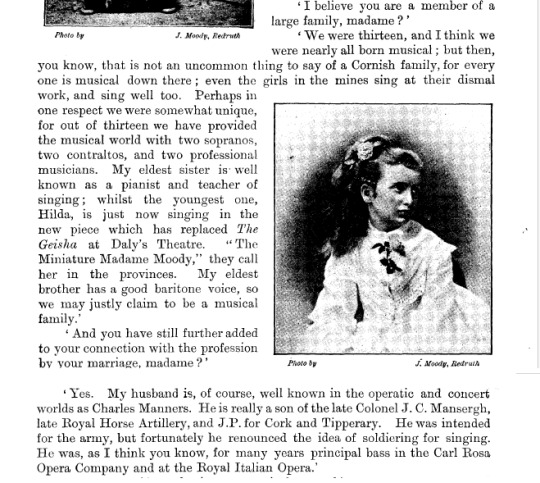
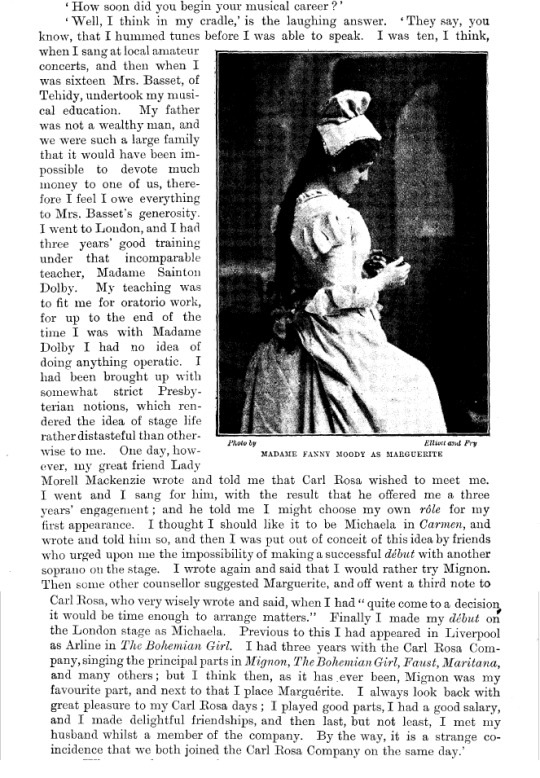

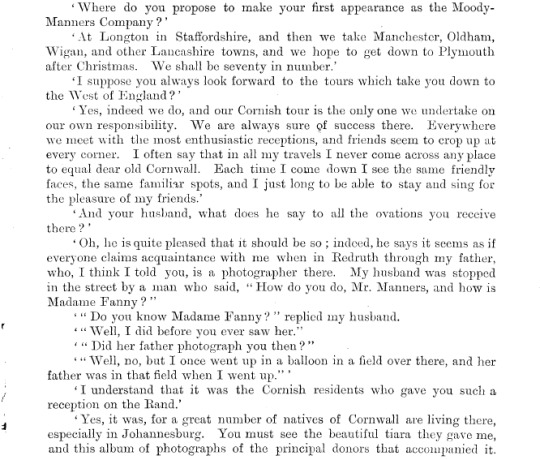
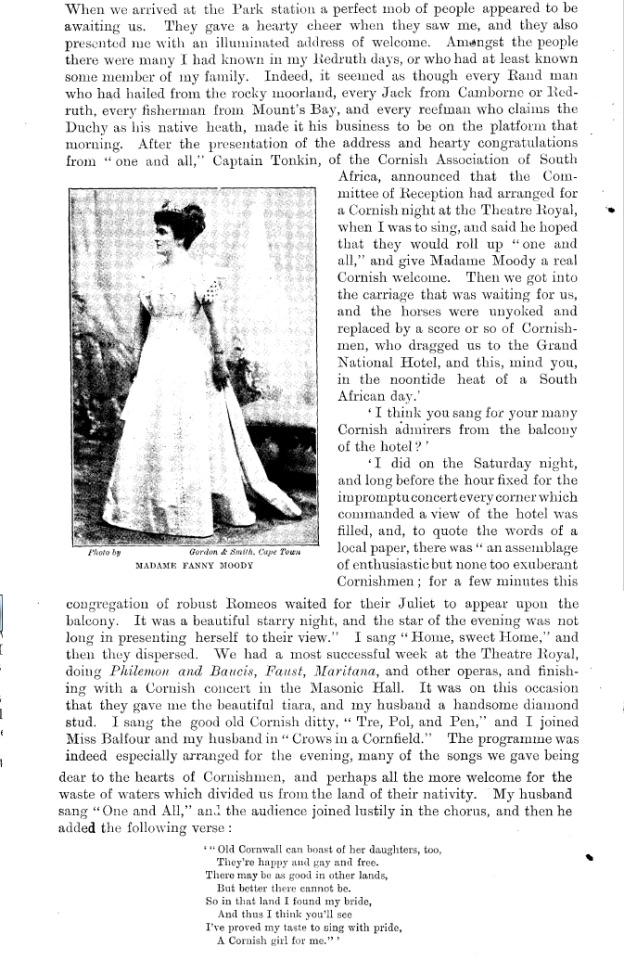
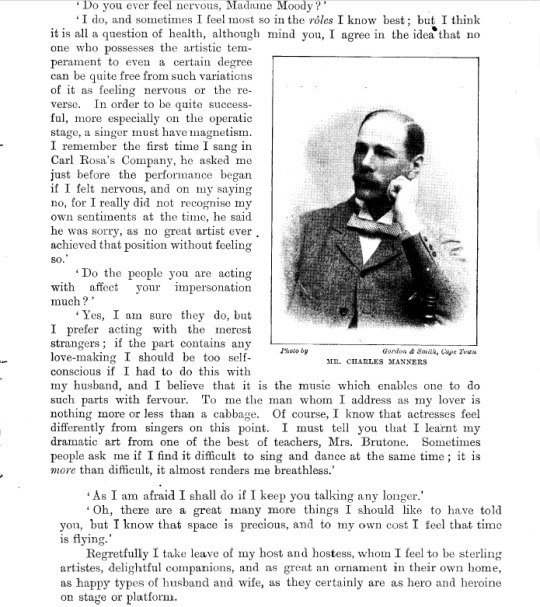
Fanny Moody – The Cornish Nightingale
Dame Fanny Moody (1864-1945) of Redruth was known as ‘The Cornish Nightingale’. Her father could, it was said, play any instrument he had ever seen. Her mother was a pianist, and their large family were exceptionally musical, in particular the daughters Fanny (Francis), Lily (1867-1950), Mabel (1874-1952) and Hilda (1876-1961). Newspaper reports show that all the sisters performed locally as young women. Fanny went on to become one of the great singing stars of her age. Hilda joined the D’Oyly Carte Opera Company in 1896, and later toured with her elder sister’s opera company. Lily, mezzo soprano, sang with J. W. Turner’s English Opera Company (1887-1902).
Fanny, allegedly seen dancing on a shop counter when young, became a pupil of Robert Heath of Redruth. Her first reported performance was in Ponsanooth on 26 March 1879 at the age of 14. Later that year Fanny’s mother died and her father was left with seven children. Nevertheless, in the winter of 1879/80, Fanny performed over a dozen concerts, mostly in Redruth, but also in Penzance and Falmouth. This intensive pattern was repeated in the next two winters, during which she built a large local following.
Her talent was recognized by Lady Mary Basset of Tehidy, who in late 1881 paid for her to train in London at the Vocal Academy of the renowned Mme. C. H. Sainton-Dolby. Fanny made her London début at the Steinway Hall, Seymour Street in June 1883. In April 1884, with other students, she gave a concert in Newcastle. All was loyally reported in Cornish newspapers.
In Newcastle she was heard by Charles Hallé, who offered her a series of return bookings. Through these she met Carl Rosa, manager of a prestigious opera company, and when asked by him to sing a ‘top C’ she gave him a ‘top D’. She made her début with the Carl Rosa Company in Liverpool on 15 January 1887, in The Bohemian Girl. Later that year Fanny’s father James died, but having seen three of his daughters on their way to operatic success. In 1889 Fanny, her fiancé, the noted bass, Charles Manners, and her sister Lily made a triumphant return to The Druid’s Hall, Redruth. The packed event was a both a celebration of Fanny’s success and of her Cornish roots.
In 1892 Charles Manners and Fanny were married. Fanny went from success to success as an operatic soprano. In 1892 she and her sister Lily sang in the first English performance of Tchaikovsky’s Yevgeny Onegin. Fanny sang many roles, including Wagner, but she was most suited to those like Cio-Cio-san, the tragic heroine of Puccini’s Madam Butterfly. Later, she and her husband formed the Moody-Manners Opera Company which operated from 1898 to 1916.
Most of Fanny’s performing life was spent touring Britain but she also travelled abroad, notably to North America and South Africa. There in 1897, after a concert, expatriot Cornish admirers followed her back to her hotel. A newspaper reported ‘There was an assemblage of enthusiastic but strangely silent and peaceful Cornishmen; this congregation of robust Romeos waited for their Juliet to appear upon the balcony…To the silent she sang Cornish songs. And as she sang, these big men of Cornwall wept.’ She was presented with a tiara with the Cornish coat of arms picked out in diamonds, which was donated for auction in the Second World War with the proceeds going to the Red Cross.
Although she travelled the world Fanny was still seen as a ‘Cornish maid’ and regularly reported in a positive, almost avuncular way by Cornish papers. Her reputation, repertoire and audience were international, but her identity was Cornish, and her success, and that of Lily and Hilda, grew from the Cornish musical environment.
Laura Alex Smith published an interview with Fanny Moody in the Cornish Magazine in 1898 which provides an insight into the singer and her world.
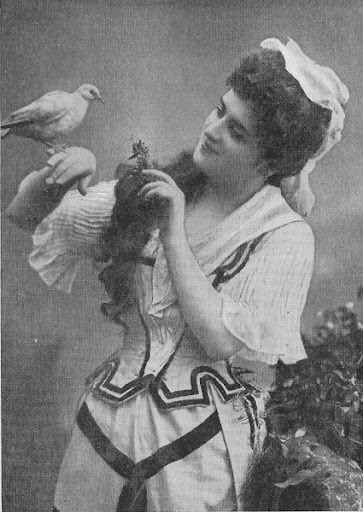
#classical music#opera#music history#bel canto#composer#classical composer#aria#classical studies#maestro#chest voice#Fanny Moody#The Cornish Nightingale#The Nightingale#Carl Rosa Opera Company#Moody-Manners Opera Company#Drury Lane#classical musician#classical musicians#classical history#opera history#historian of music#history of music#musician#musicians#diva#prima donna
4 notes
·
View notes
Note
Hi! If you don't mind, could you expand on the Cornwall is (not?) England post? I'm a little confused but extremely intrigued
Sure!
Cornwall is a Brythonic Celtic nation. Culturally and historically it has more in common with Wales and Brittany (and, more distantly, other Celtic nations) than it does with England. At one point in history the Welsh and the Cornish were very connected, but England now physically separates them (Side note: this is why people refer to King Arthur as Welsh, despite him being born in Tintagel in Cornwall. "Welsh" here is being used to refer more broadly to Brythonic people) Cornwall has its own language, mythology, music etc
While Wales gets some legal recognition as a nation (though not enough imo), Cornwall and Brittany do not and are considered a part of England and France respectively. Some Cornish people want independence, others just want more recognition than they currently have, and a lot of us are focused on the No Second Homes movement
Because of all of this, Cornish people don't consider Cornwall to be a part of England. As of the last census, 14% of people in Cornwall define their national identity as Cornish and nothing else (bearing in mind that due to the extreme rate of second homes, a lot of people in Cornwall at the time of the census may not have been Cornish)
Like I said, even Cornish people who don't feel strongly about independence will state as a fact that Cornwall is not English. It's just understood as a given, for the same reasons that Wales is not considered English
#Cornwall#Cornish#kernow#nyns yw marow#kernow bys vyghan#cornish history is long and complicated so this is just a brief overview
15 notes
·
View notes
Text
I relate hard to Mina because I too will sit and listen to elderly Englishmen talk passionately about local history and nod even though I’m only getting 70% of what they’re saying
#listen the Cornish accent is HARD#Yorkshire accents are far easier to understand than Cornish ones - especially from old men lol#it’s really fun though they know everything#but you also get the impression that they’re biased towards their own experiences of the local history (OBVIOUSLY)#I love Mr Swales#dracula daily#dracula#I once said hello to an old man on the train who proceeded to talk for THREE HOURS ABOUT ARCHITECTURE#it was awesome#old englishmen are surprisingly progressive I’ve noticed#some of the best dialogue or characters I’ve ever written have been inspired by irl Mr Swales
34 notes
·
View notes
Text
Best things to do in Cornwall
*New post*
Where to stay, what to eat and what to avoid, based on my years of living in and visiting Cornwall.
#travel#europe#food#cornwall#beaches#seaside#history#cornish pasty#pasty#padstow#falmouth#newquay#eden project#port isaac#uk#uk tour#places to visit#visit uk#holiday
2 notes
·
View notes
Photo

Here is my artistic rendition of a clan of Celtic warriors on the march to battle! I leave it open to interpretation what tribe of Celts these guys are. They could be Gauls or Britons on the march to kick some Roman butt. They could be Picts on the march to battle with invading Saxons. They could be Gaels looking to put down a rival clan. Regardless of how you see it, the ogham inscription at the center sews a common thread among all interpretations. It reads, “VICTORY!” Apparel, prints and more with this new artwork can be found at this link --> https://celtichammerclub.threadless.com/ ➖ #celtichammerclub #celt #celtic #celticart #celtictattoo #celticknot #celticspiral #irish #scottish #welsh #cornish #british #warrior #fashion #style #history #celticmusic #originalart #originalconcept https://www.instagram.com/p/Cp0oZhOOv_g/?igshid=NGJjMDIxMWI=
#celtichammerclub#celt#celtic#celticart#celtictattoo#celticknot#celticspiral#irish#scottish#welsh#cornish#british#warrior#fashion#style#history#celticmusic#originalart#originalconcept
8 notes
·
View notes
Text
Next time you hear someone complain about how people should drop historical injustices, let them know there are people in Cornwall who object to commemoration/veneration of Aethelstan (sometimes considered the first king of england), who died in 939CE, because apparently he drove the Cornish out of Exeter and made it legal for an Englishman to kill a Cornishman- apparently decreasing the population of indigenous Cornish people by about 10%.
The fun thing about this is that it might even be all nonsense, because the Cornish had been nominally under “English” control for some time at this point.
Aethelstan also fought the Welsh, Scottish and Irish with varying degrees of success.
Anyway, my point is that a people who feel their national identity has been oppressed can hold a grudge that’s possibly entirely based on fiction for over 1000 years.
Talking about things that happened less than 200 years ago, to people’s direct ancestors that they can name, and we can, in some cases describe the exact events... well, that looks pretty reasonable now, doesn’t it?
But also Meea navidna caw zasawzneck and all that.
28 notes
·
View notes
Text


The conclusion in this 1920’s visitor’s guide to Boscastle really just went all for it, huh
#fuckin travel book making me emotional#and this was BEFORE I got to go inside the archives#which as some of you know made me experience the entire range of human emotion#TO THOSE WHO LIVE THERE IS NO END#that last paragraph just goes for it. it knocked me into next Wednesday ngl#christ on the cross#boscastle#cornish history#travel#cornwall#I’ll add a text ID later but rn?#I’ve been staring at handwriting and really tiny print under bright fluorescence lights for hours#my eyes are so tired
5 notes
·
View notes
Text
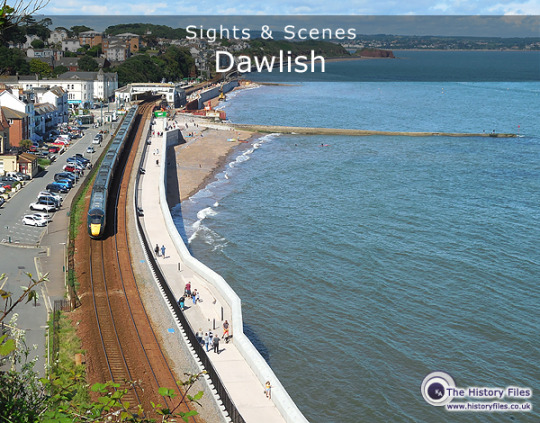
Sights & Scenes: Dawlish, Devon
The town of Dawlish in the county of Devon is a traditional seaside town, one which has a wonderful golden sand beach on its doorstep, just twenty-four kilometres from Exeter.
2 notes
·
View notes
Text
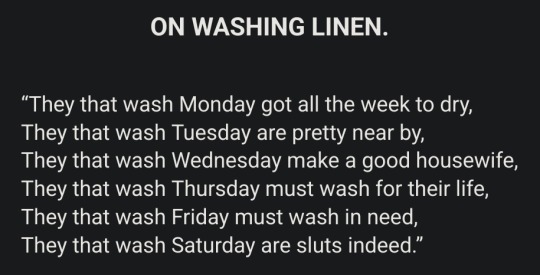
so I was on Project Gutenberg looking through this book about folklore and folk rhymes from Cornwall when I stumbled on this gem. that last line took me right out
#ye olde cornish ladies be like: you weekend-laundering whore!#folklore#rhymes#history#cornwall#traditions#project gutenberg
6 notes
·
View notes
Text
bledhen nowydh da everyone i am doing jack shit today aside from decorating my journal page and listening to music because it is BAD LUCK TO CLEAN ON NEW YEAR'S
#this is a bretonic celtic thing and i think it's more specifically welsh but i'm cornish and scottish so i'm a celtic cousin on both sides#i might get frisky this afternoon and read my history of sesame street#shut up alix no one cares
4 notes
·
View notes
Text
I just feel like an interesting aspect of black sails that I haven’t seen people talk about is how flint was raised in cornwall - a region that until around 1700 was seen as a distinct entity and its people were seen as distinctly separate to (and lesser) to Englishmen. Like the flashback scenes in the show are from 1705. It’s just another aspect through which the show highlights that colonial violence comes for everybody and that even those victimised by it often also commit it
#I’m Cornish and my dads Irish family committed some crimes so#the Welsh and Scottish were over represented in colonial armies#yet now historical revisionism and separatism tries to erase that history#no one wad free of blame and guilt but no one was free from the perpetual threat of violence#bc the violence of colonialism cannibalises itself
1 note
·
View note
Text

@skylineofspace FUCKING LOVE THIS. What an expansive, out of the box thought, I didn’t even GO there. That would also make sense with the weird feeling I’ve been having about Ange being a French name* and her being English not like, English people can’t Read Books and Name Their Children Something Other Than Aloysius but it’s so striking against names like Charlotte, Beatrice, Dorothy, which are all chosen to FEEL very English in a way Ange does not. Anyway yeah I love that idea.
@verbforverb We know Scotland (Highlands) is its own thing here, and I don’t know if like...Sheeplandia is going to show up here for Wales or anything, but for Cornwall, it sounds like it belongs to the COmmonwealth, or else he wouldn’t need to defect there? Because he’s already living in “The West” which I assume is the standin for America/Canada, so if Cornwall were its own thing, he should be able to just go there? I would think? Unless Cornwall is allied with the Commonwealth in such a way that travel there is banned for a citizen of the Kingdom?
I DON’T KNOW I JUST THINK THINKING ABOUT IT IS NEAT
*Which literally means Angel, I should have mentioned this in my talking about Charlotte and all that shit. Angels can only tell the truth, etc, Ange is built on lies, narrative theme, etc.
#Doc watches Princess Principal#PP episode 2#Also I didn't know Cornwall was a celtic nation TIL#IN the montana mutt mix#its always Irish English German Scandanavian#The English if known is almost ALWAYS Cornish because of thehuge mining history#I don't know what corner of England I have somewhere...I don't even know that I do except that my dad's whole side of the family#Is Classic Montana Mutt and has been here for like...four or five egenrations#So I ABSOLUTELY have English somewhere in the mix#Montana Mutt is enough for me though everyone knows what I mean ahahah#'are you Irish?'#'I'm a montana mutt so I have rish heritage somewhere certainly but that's not where the red hair comes from ahaha'#I think the only actualy anything I know on my dad's side is my great grandmother was a Swedish immigrant#or great great grandmother actually#anyway I'm an American and this has gone off the rails but yeah 80% of the English Heritage here is Cornish English specifically#Its why pasties are a huge huge thing in Montana
4 notes
·
View notes